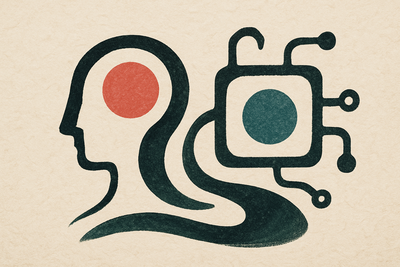The AI Advantage: Can Machines Beat Humans at Stock Picking?

Stock picking has long been seen as an intricate skill mastered by veteran human experts. But rapid advances in artificial intelligence (AI) and machine learning are putting that notion to the test. In certain areas, machines may now be able to surpass even the smartest humans at picking stocks.
The Case for Human Judgment
Many investors argue human intuition and experience remains superior for stock selection. Unlike machines, seasoned investors can read between the lines in financial statements, picking up on subtle cues hidden in footnotes or management commentary. They can also qualify data with real-world business savvy and insight into human psychology. AI still struggles to match these “soft skills.”
Billionaire investor Mark Cuban argued ↗ that the stock market fundamentally boils down to understanding human emotions and behavior:
“I think everybody has it wrong right now. People think getting trading information is going to help them beat the market. Trading stocks is not checkers or chess. Markets are made by humans that are expressing human emotions.”
This emphasis on insight into human factors gives the edge to humans according to experts like Tom Stevenson:
“Stock markets are complex adaptive systems with many moving parts. Successfully investing involves a holistic perspective into industries, macroeconomics, investor psychology and animal spirits. AI algorithms can’t yet grasps these subtleties.”
With experience, judgment and creativity on their side, the best human investors seem difficult to displace. But machines have some analytical advantages of their own.
The Data-Driven Strengths of AI
AI provides machines with superhuman data processing power, speed, and statistical analysis capabilities. With advanced machine learning techniques like deep neural networks, AI can impartially analyze vast datasets with millions of data points. It can uncover subtle signals and combinations that human analysts routinely miss.
For example, a 2015 study ↗ showed deep learning algorithms could solve certain math problems that have confounded human experts for decades. The number crunching power of AI is real.
Former Renaissance Technologies executive Noah Smith explained ↗ the data advantages conferred by machine learning:
“An AI can read every single one of the thousands of earnings transcripts published every quarter, and keep them all in memory to refer back to. It can read every 10-K filing by every company. It can analyze every single stock price movement in history.”
By exhaustively analyzing massive training datasets, the most sophisticated AI models can learn to detect subtle patterns and signals in company fundamentals and market activity that lead to predictive ability. And they continually improve through practice - artificial intelligence literally gets smarter over time.
MIT AI researcher Lex Fridman notes that another advantage is a lack of human biases and emotions:
“One of the beautiful things about AI is that it’s very hard to corrupt. It will just do what it’s programmed and trained to do, for better or worse.”
With huge data processing capabilities and built-in discipline, AI threatens humans in certain investing activities.
Where Machines Beat Humans
According to an analysis ↗ by Stanford Professor Nicholas Bloom and colleagues, areas where machines outperform human investors include:
- Filtering and ranking stocks - Algorithms beat humans by ~20% in predicting future returns when screening and ranking stocks based on financial statement data.
- Sentiment analysis - Machine learning models exceeded humans in analyzing the sentiment and tone of earnings conference calls, earning ~4% higher returns.
- Forecasting earnings - AI bested human analysts by ~5-10% when forecasting company earnings per share.
- High frequency trading - Algorithms far exceed humans in domains like high-speed quantitative trading where split-second speed and emotionless discipline is mandatory.
- Portfolio optimization - AI optimized portfolios for the lowest risk and maximum diversification benefits compared to human constructed ones.
Machines demonstrate clear advantages in data-heavy tasks with well-defined statistical relationships. But human judgement still reigns in other areas.
When Human Intuition Still Reigns
Some investing activities remain too unstructured or qualitative for machines to match human intuition and reasoning. Areas of continued human superiority include:
- Assessing intangible strengths - Sizing up qualities like management vision, charisma, integrity, and leadership chemistry remains human territory.
- Anticipating competitive dynamics - Humans are still better at thinking strategically and anticipating competitors’ countermoves and disruption risks.
- Incorporating “soft” data - Humans can contextualize and evaluate new data like customer reviews, industry scuttlebutt, images and videos.
- Holistic assessment - Humans excel at stepping back and forming unified pictures of how all the company, market, and macroeconomic factors integrate and interact.
Machines act as complements rather than replacements to human analysis. The most successful investors will likely be those who figure out how to best integrate human and machine capabilities over the coming decades. Each has strengths to contribute.
The Machine Revolution Has Arrived
The machine revolution has already brought automation to certain investing tasks, though human intuition remains indispensable. AI provides an analytical edge in data-heavy environments like quantitative algorithmic trading. But human creativity, strategy, and judgement skills will continue to be vital for activities requiring reasoning and nuance.
Rather than machines fully replacing human investors, the future likely belongs to effective combinations of the two. Each has complementary strengths. Together, they may conquer inefficiencies and unlock new alpha.